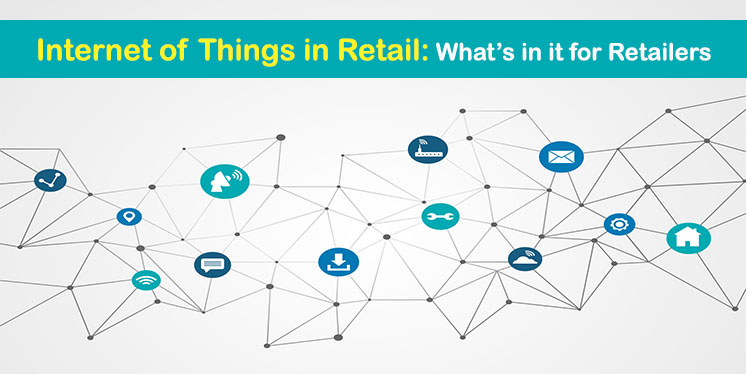

Internet of Things in Retail: What is it for Retailers?

The Internet of Things is changing and revolutionizing every aspect of our lives. Whether it’s leisure, business, retail or healthcare, almost every industry is adopting new technologies, and the Internet of Things is no exception. McKinsey estimates that by 2020, there will be 200 billion to 30 billion connected devices, with a total value of $17 billion.
The above statistics clarify the various concerns regarding the adoption of IoT in various industries. Growth does not appear to be diminishing and overall adoption will be equal. As competition intensifies, retailers are trying to take necessary steps to provide a unique shopping experience and gain more profits, uniqueness and efficiency.
There is a lot to discuss when it comes to IoT retail, but first let’s briefly introduce what IoT is.
What is the Internet of Things (IoT) and its use in daily life?
When we talk about IoT, it is a term used to describe machine-to-machine connections where hardware devices and sensors interact with each other across devices and locations.
Many of us, knowingly or unknowingly, use an IoT device or see it somewhere. For example, the Nest Thermostat is widely adopted by owners to set the temperature at a desired level. After reaching the set temperature, it will automatically shut down to save electricity bills.
Moreover, IoT devices have been widely integrated into home appliances, such as air conditioners, refrigerator dryers, ovens, etc.
Talking about the retail industry, IoT allows retailers to track customer behavior and collect data for future business decisions. If you are looking forward to implementing IoT in your retail business, be sure to read this article to understand what IoT has to offer retailers.
IoT in retail
Before discussing the Internet of Things (IoT) for retailers, let’s briefly touch on the benefits reported by early adopters.
77% of retailers see IoT as a means to transform customer experience
89% of retail early adopters benefit from insights about customer preferences and IoT behavior.
77% of retail IoT early adopters provide better opportunities to interact with new partners to deliver products and services to customers.
Digital signage reaches consumer devices
With the rise of online shopping trends, the retail industry is largely affected by the way consumers are affected. People tend to buy more online items because the items are cheaper. Moreover, comparison shopping is also one of the reasons for online shopping.
As a result, traditional retailers face many challenges. With the ability to save money, convenience and comparison shopping, people still need the help of a sales assistant to save some time researching the items they are inclined to purchase.
The retail war is growing rapidly, with brick-and-mortar store owners having to set prices to match online prices. It is quite a challenging task for traditional retailers to attract customers to their stores.
The Internet of Things can solve this problem. For example, traditional retailers can deliver digital signage and customer feedback connected to social networks to customers in their stores. This will help customers view information about the product instead of using mobile devices.
Digital signage discussed earlier can also help display relevant merchandise, which may be of interest to customers. Furthermore, it can guide customers in the direction of goods to complement their purchases.
Another aspect of marketing is understanding customer behavior. To attract more customers, ads can be displayed in the notification bar of mobile phones as they pass through the store. Retailers can also introduce their in-store customers in the best possible way through real-life products through sales assistants.
Sales associates, on the other hand, can check whether a product is in stock and complete the transaction seamlessly. This is where IoT can help, providing sales assistants with store availability checks via their smartwatches.
The smartwatch connects to a database of all products connected to the sensor. Additionally, the sales assistant can show how the product works using a tablet. Finally, sales associates can use the same tablet to close deals instantly.
Guide customers to find goods
Retailers must hire employees to assist customers, as well as all customers in the store. Supermarkets are overflowing with products and finding a specific product is not an easy task. This means customers will have to spend a lot of time in supermarkets looking for the products they need.
However, IoT can save customers and retail owners time and money by hiring additional staff. For example, equipping stores with sensors can help salespeople and customers find specific products. Additionally, digital displays with the ability to read sensors can inform customers about product descriptions, their benefits and, in the case of food products, nutritional levels.
In the case of food products, many of them have a short shelf life. IoT can prove useful in ensuring that the due date is correct before delivery to the customer.
ecosystem opportunities
Most home improvement, general merchandise and electronics retailers opt for home automation or smart home. Not only do businesses need IoT, but they also need it open to the general consumer.
Retailers have taken advantage of this opportunity to become ecosystem players, generating service support, sales support and automated orders through IoT sensors in consumers’ homes. For example, Amazon is currently working on an order method for anything you might ask Alexa.
in conclusion
In this era of technology, retailers need to understand the importance of implementing IoT to stay ahead of the competition, increase revenue and build a customer base. However, if you are new to the technology, many IoT solution providers will help you with strategy, planning, and deployment.
Author: Ray Pike
